Good news first: The water bar in the chicken coop is fixed and operational. No more daily water hauling down to the girls. My very impressive husband pulled off this feat of strength and will remain in my good graces for the foreseeable future. (Maybe.)
So many of you offered suggestions! I was appreciative of how interested (and knowledgeable) everyone was. Had I only known, there might have been a quicker and easier route to getting this done. But I’m glad to get the week of Spring Break off to a good start with a little spring cleaning and looking forward to getting more done, although I’ll spare y’all the details; maybe a nice “after” picture, though. Even though I’ll be spending more time with family this week, I’ll still be checking in so we stay up to date on important developments.
As anyone who has had the news on or the internet open at any point in the past week knows, Monday is the day New York Attorney General Tish James has said she will start collecting on the $454 million (and counting, because of the daily interest add-on) judgment she got against Donald Trump for business fraud if he doesn’t get a surety bond in place. Last Monday, Trump’s lawyers told the court they had tried—and failed—to get a bond. They asked the court for a stay or an alternative to a full bond.
Trump’s lawyers argued that the court should stay the execution of the judgment against him, claiming that the AG was incorrect when she argued that the court lacked the authority to waive or reduce an appellate bond requirement. Trump’s lawyers claim the court has the inherent authority to do so or to keep James from enforcing the judgment now. They say that “the court may consider ‘any relevant factor, including the presumptive merits of the appeal and any exigency or hardship confronting any party.’”
So what is the “exigency or hardship”? The compelling reason the Trump team puts forward is their claim that they made “ongoing diligent efforts” that “have proven that a bond in the judgment's full amount is ‘a practical impossibility.’" They claim to have approached “30 surety companies through 4 separate brokers,” but “A bond requirement of this enormous magnitude-effectively requiring cash reserves approaching $1 billion … is unprecedented for a private company.” Trump’s lawyers claim that “Even when it comes to publicly traded companies, courts routinely waive or reduce the bond amount. Enforcing an impossible bond requirement as a condition of appeal would inflict manifest irreparable injury on Defendants.”
You’ll be stunned to learn that isn’t exactly true. Even Fox News told its audience it wasn’t the case.
Politifact concluded that companies have posted appeals bonds of $1 billion or more, twice the surety Trump must provide, although that is mostly larger companies, rather than closely held privately owned businesses like Trump’s. Trump claimed in a post on Truth Social that, "The Bonding Companies have never heard of such a bond, of this size, before, nor do they have the ability to post such a bond, even if they wanted to."
Trump’s brief argues there are no “actual victims” in this case and makes light of his conduct. This is the heart of what it means to be Trump—the sense of entitlement that leads him to believe he can ignore the judgment of a court of law as if it is of no consequence. “This case has no victims, no damages, and no actual financial losses … The $464 million penalty in this case has been aptly described as ‘using a Hellfire missile to annihilate an [alleged] shoplifter.’” (Trump’s lawyers quoting the Wall Street Journal there.) Trump can think whatever he wants, but the Judge ruled that New York’s Attorney General proved her case. It would be a mistake if the appellate court offered him any special treatment. They should let the AG go ahead and collect on behalf of the people of New York unless Trump posts the bond.
And, Trump, in another of his “truths,” maintained he had plenty of cash on hand. Despite everything his lawyers told the court, Trump said he had the money, but he wants to use it for his campaign, not a bond. He can certainly do that, but decisions have consequences and here, it’s that Tish James can get to work.
Also in New York, Monday, we get a hearing instead of a trial in the Manhattan DA’s criminal prosecution against Donald Trump. Trump came in strong on this one originally, arguing that the U.S. Attorney’s Office in Manhattan had turned over more than 100,000 pages of discovery since March 1 that the DA had failed to provide him with, claiming this and other discovery violations by the DA meant the case should be dismissed or at least delayed by 90 days. The DA’s office, also seeing the documents for the first time, agreed to a 30-day continuance.
As it turned out, though, only about 270 documents had anything to do with this case, and the DA’s office wasn’t responsible for failing to provide those to Trump—they had been in the possession of the FBI when the DA asked the U.S. Attorney for any relevant documents and not within the DA’s control. Once the dust settled and the DA understood what Trump’s complaints involved, he took a different tack, and also went on the offensive, arguing that the Trump lawyers were engaged in delay tactics that “stretched the boundaries of zealous advocacy.” They urged the court, “Enough is enough. These tactics by defendant and defense counsel should be stopped.”
When Judge Merchan granted the 30 day extension, he told the lawyers and the defendant to keep their calendars clear. The case could go to trial as soon as April 15 if he agrees with prosecutors in tomorrow’s hearing.
Tuesday, the Supreme Court hears oral argument about the future of the drug mifepristone, one of two drugs used for medication abortion. You will be able to listen to the oral argument at this link. Mifepristone, coupled with misoprostol, is the drug protocol for both miscarriage-management and abortion.
Readers of Civil Discourse know that mifepristone is safer than Tylenol and Viagra. The lower court decision, made by a Trump-appointed judge who took the bench with an anti-abortion track record, was based on bad science. Two of the studies used to support it were revoked. And the lawsuit was brought by plaintiffs—emergency room doctors who speculated they might one day have to treat a patient who used the drug and then had complications, which would be an affront to their religious beliefs—who lacked the standing the law requires plaintiffs to have before they can file a lawsuit.
In Dobbs, when it reversed Roe v. Wade, the Supreme Court wrote that the future of abortion access would be up to each state. This case poses the question of whether we can take them at their word or whether they’re willing to go so far as to significantly limit the use of mifepristone, which would bring us closer to a national ban, given the widespread use of medication abortion. And also, in a presidential election year and knowing the demise of Roe galvanized voters in elections following Dobbs, it’s impossible to avoid speculating that even conservative members of the Court may be looking for a way out that lets them avoiding fanning the political flames even further.
If you missed it Friday night, former President of Planned Parenthood Cecile Richards was our guest for “Five Questions With,” with a thorough analysis of the challenges we face. If you’re interested in a deeper dive into the issues before the oral argument, check out this podcast for with the amazing Supreme Court analyst Dahlia Lithwick. She won’t make you sleep any easier, but you’ll be better informed.
Last week, Trump filed his opening brief with the Supreme Court in his appeal arguing Jack Smith’s election interference prosecution against him should be dismissed because of presidential immunity.
This issue the Court has said it wants to consider is, “Whether and if so to what extent does a former President enjoy presidential immunity from criminal prosecution for conduct alleged to involve official acts during his tenure in office.” Trump’s lawyers argued a president enjoys absolute immunity for official acts and cannot be criminally prosecuted for them. They also told the Court that if it found some acts by a president didn’t enjoy immunity, any decision by the trial judge that the acts Trump is charged with were beyond the bounds of immunity would have to come back to the Supreme Court for appellate review before there could be a trial. In other words, more delay. Always delay.
The brief is replete with citations to the Federalist Papers, to an article by deceased Justice and conservative icon Antonin Scalia, and even to two articles by current Justice Brett Kavanaugh. It’s a full-court press because if Trump wins, the prosecution is over. But it’s also nuts, given his theory that anything a president does that is arguably official—in Trump’s view, this is just about everything—a president could also order a political assassination or the theft of an election and walk away with immunity. If Trump can do it, then Biden or any other president can too, and that’s a result that replaces a duly elected president with a dictator. It would be the wrong result in this case, and in any event, one with bizarre dimensions as it would take a conservative majority to get there, and they would be doing it during a Biden presidency.
Oh, and Saturday, after the brief, which argued for near-absolute immunity was filed, Trump conceded in a “truth” that absolute immunity didn’t exist, asking when Joe Biden would be held accountable for his illegal acts. You can’t make this stuff up.
Next up: The Special Counsel’s office has a response due no later than Monday, April 8.
The Bureau of Prisons inmate locator now has an entry for Trump crony Peter Navarro, who surrendered last week to serve his sentence. Navarro will spend four months in federal prison for contempt of Congress, after ignoring a subpoena during the January 6 committee hearings. He’s spending his first nights in custody and probably finding it not much to his liking. Sometimes, a defendant has to have this sort of hands-on experience with their possible future before they come to grips with it. Although that hasn’t worked with Trump’s former CFO Allen Weisselberg, perhaps Navarro will view it differently. Could there be a visit by federal prosecutors in his future? You never know.
We’re in this together,
Joyce




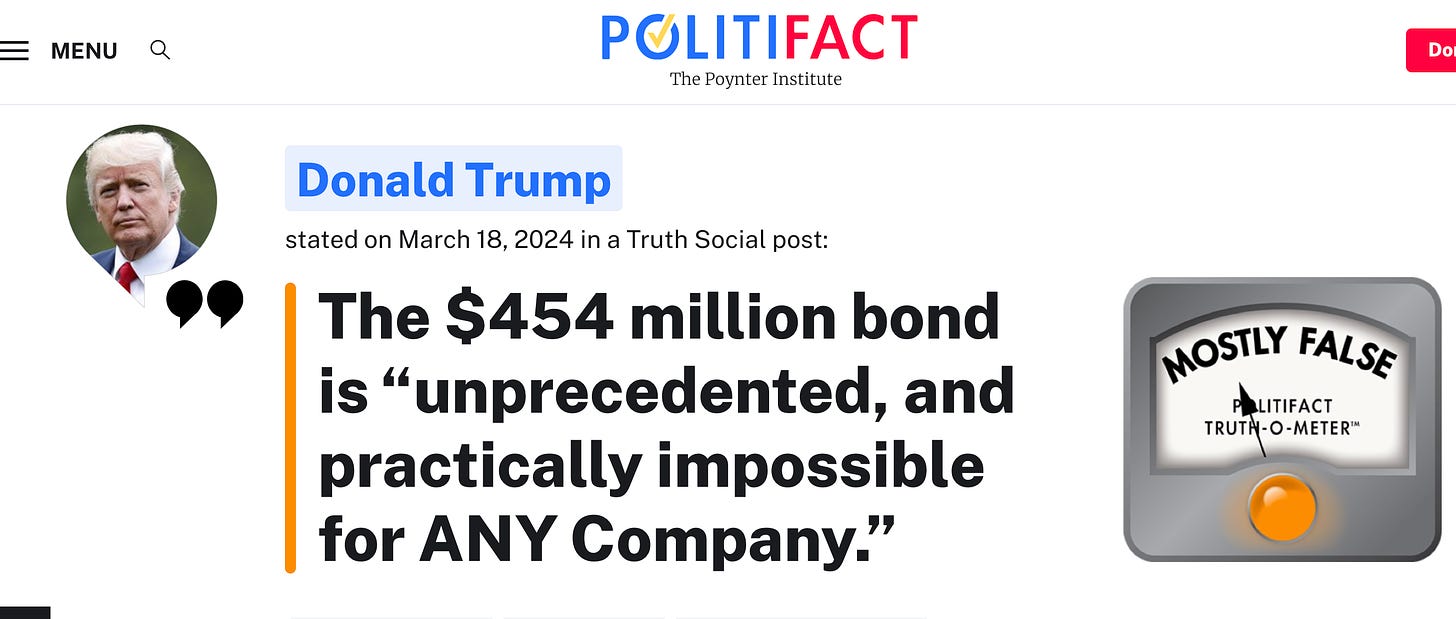
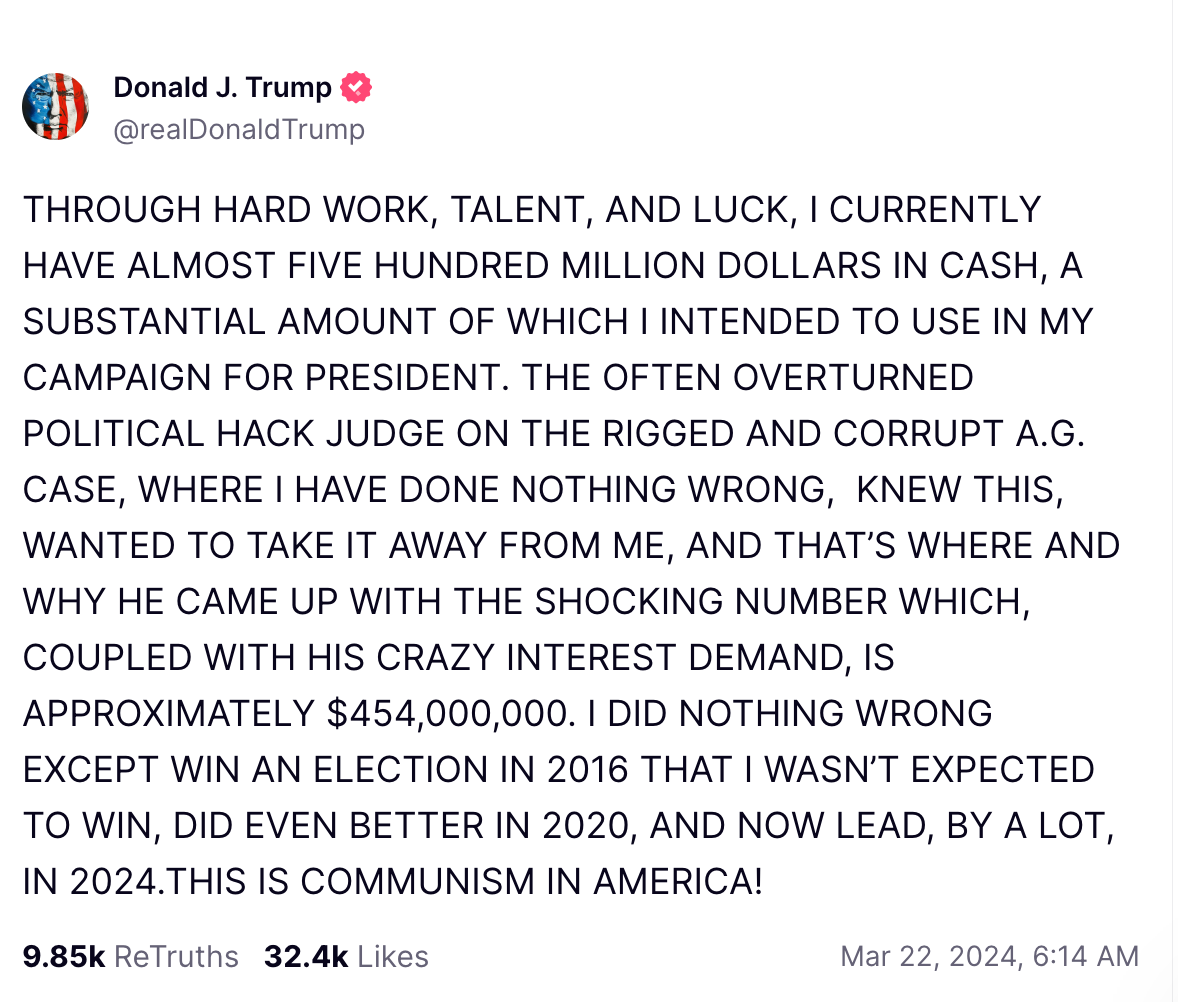
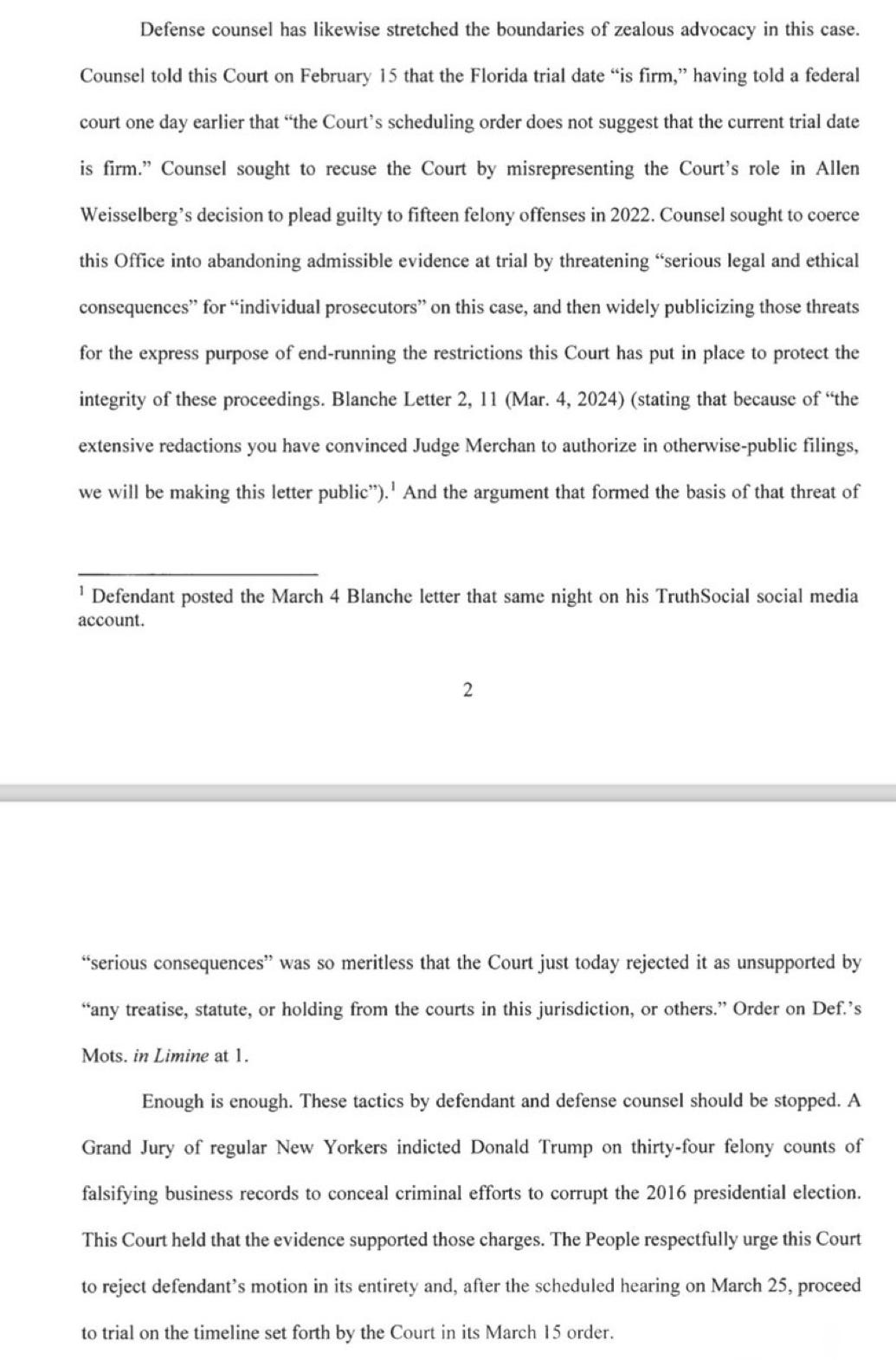

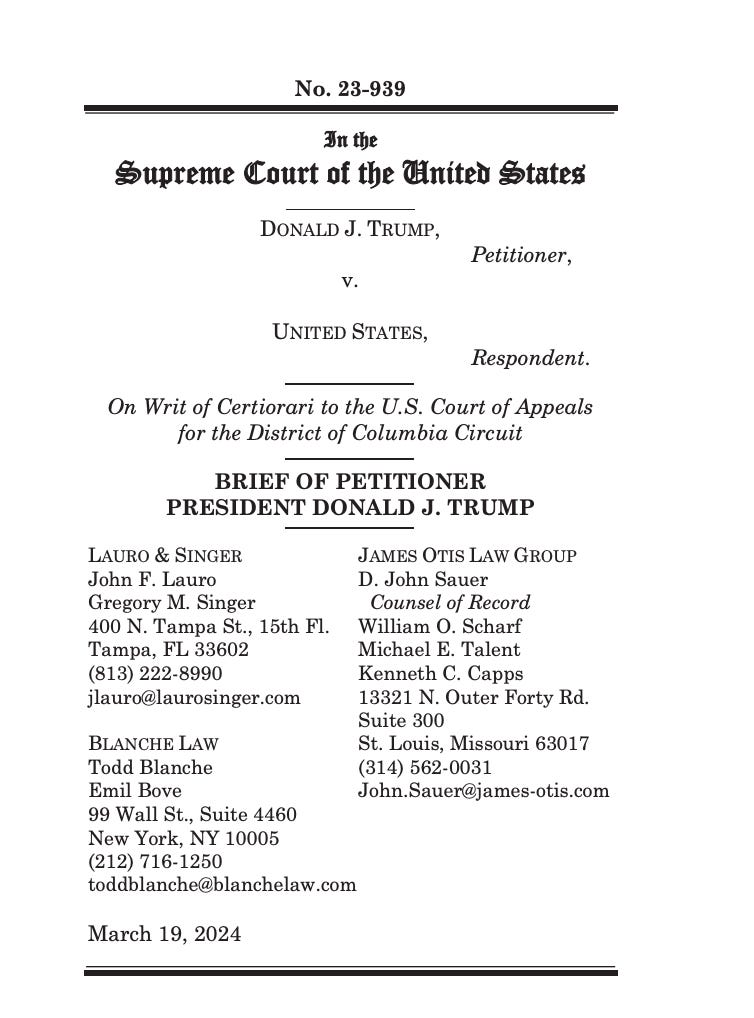
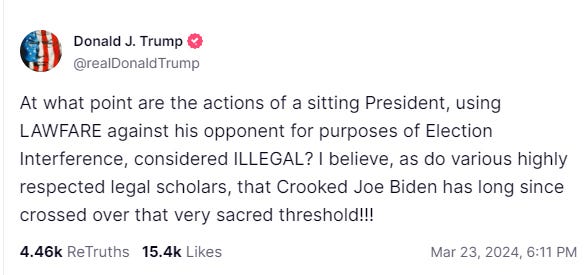
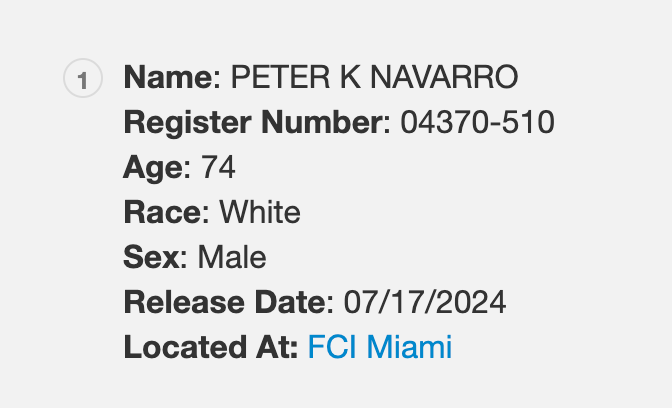








The Week Ahead